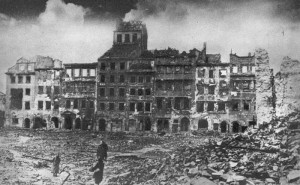So, by March 31, 1939, 16 days after Hitler entered Prague, the United Kingdom, which until then had “not noticed” Germany’s aggressive nature and had surrendered Austria and Czechoslovakia to Hitler and meekly handed over the Saarland and the Rhineland, was now ready to fight him. On that day, the British prime minister, Neville Chamberlain, made an official statement, claiming that “in the event of any action which clearly threatened Polish independence and which the Polish Government accordingly considered it vital to resist,” Great Britain would provide support to Warsaw.
It was not Germany, but Poland and Great Britain that violated their own treaties! Poland had violated the German-Polish treaty by announcing a mobilization, and then violated it again when she accepted British promises to guarantee her security. The treaty between Poland and Germany precluded any conflict between the two countries, and after signing a treaty with the British, the Poles were then obligated to fight the Germans in the event of an Anglo-German war. In addition, signing a treaty with Warsaw and issuing guarantees conflicted with the British-German treaty. A supplementary agreement to the Munich treaty stated that neither Germany nor England could enter into any political commitments without prior consultations with one another. But Britain was now obligated to declare war against the Germans if a conflict erupted between the latter and Poland!
![British prime minister Neville Chamberlain holding a copy of the supplemental British-German Declaration [1] by his plane after return from Munich, September 1938.](http://orientalreview.su/wp-content/uploads/2015/04/chamberlain-anglo-german-agreement.jpg)
But the relentless pressure on Hitler backfired. In his famous speech on April 28, 1939, the Führer renounced the Polish-German Non-Aggression Pact as well as the Anglo-German Naval Agreement. But he did not do so because he “wanted to take over the world,” but because the Poles and the British had actually already broken those treaties with Germany (albeit unofficially) by signing an agreement with one another.
Rather than submit once again to “guardianship” under Britain, Hitler issued his “patrons” a challenge. And he decided to eliminate Poland, his unpredictable and hostile neighbor. However, Hitler was not an idiot. He remembered the First World War very well, and he would never have resolved to attack Poland and face the prospect of a fight on two fronts (against the Soviet Union on one hand, and against Britain and France on the other). For him to take such a step, he had to be convinced that neither London nor Paris would intercede for the Poles. In such a scenario, the British and French would remain on the war’s sidelines, and (in accordance with their old plans) enter the fray only after the Russians and Germans had bled each other dry.

Poland was destined to share the fate of Czechoslovakia and Austria. The Poles had to be sacrificed upon the altar of political practicality. London induced Warsaw to sever its “friendship” with Germany, and thereafter the primary task was to maintain the Polish-German crisis at the requisite fever pitch. Great Britain promised to support and assist Poland, but in reality did not lift a finger. The British began to drag their feet about ratifying the Polish-British treaty. It was signed on April 6, 1939, but in practice the Polish-British treaty would not go into effect (i.e., be ratified) until Aug. 25.
London and Paris were not at all interested in the destruction of the aggressive German Wehrmacht, but rather in ensuring its resounding victory over the army of their ally, Poland. Poland’s overwhelming defeat was supposed to be quick and entail minimum bloodshed for the German army. “Quick” – because the Germans were not prepared for a lengthy war and did not possess adequate stockpiles of weapons, and “bloodless” – so that Hitler could essentially move on directly from there into the USSR. If the German army suffered catastrophic casualties in Poland, it would not be ready to go to war with Russia/USSR.
The British and French policy was not aimed at setting up a resistance movement that would ensure Hitler’s rapid defeat, but was rather intended to create the most favorable environment for Germany’s extermination of Poland.
In the next chapter we will examine the most intriguing period on the eve of World War II – the diplomatic maneuvers during the summer of 1939 that culminated in the infamous Molotov-Ribbentrop Pact.
ENDNOTE:
[1] The day after the Munich Agreement was signed, the British prime minister, Neville Chamberlain, invited Hitler for a private talk. He suddenly pulled a sheet of paper from his pocket: “We, the German Fuhrer and Chancellor and the British Prime Minister, have had a further meeting to-day and are agreed in recognizing that the question of Anglo-German relations is of the first importance for the two countries and for Europe,” reads the document. And “the agreement signed last night and the Anglo-German Naval Agreement” were regarded by the leaders of the two countries as “symbolic of the desire” of both nations “never to go to war with one another.” Historians usually “forget” about this document. However, it must have been this unimposing agreement that ensured Hitler’s aggression toward the East. Chamberlain’s return to London from Munich is quite often depicted in historical documentary films. He is standing by his airplane, shaking a piece of paper in the air, and loudly proclaims: “Peace for our time!” And the audience thinks that British prime minister is holding a copy of the Munich Agreement. But in fact, Neville Chamberlain is clenching this supplemental British-German Declaration.
ORIENTAL REVIEW publishes exclusive translations of the chapters from Nikolay Starikov’s documentary research ““Who Made Hitler Attack Stalin” (St.Petersburg, 2008). The original text was adapted for translation by ORIENTAL REVIEW.
PREVIOUS EPISODES
Episode 14. How Adolf Hitler turned to be a “defiant aggressor”
Episode 13. Why London presented Hitler with Vienna and Prague
Episode 12. Why did Britain and the United States have no desire to prevent WWII?
Episode 11. A Soviet Quarter Century (1930-1955)
Episode 10. Who Organised the Famine in the USSR in 1932-1933?
Episode 9. How the British “Liberated” Greece
Episode 7. Britain and France Planned to Assault Soviet Union in 1940
Episode 6. Leon Trotsky, Father of German Nazism
Episode 5. Who paid for World War II?
Episode 4. Who ignited First World War?
Episode 3. Assassination in Sarajevo















Pingback: Episode 15. Poland Betrayed (IV)… | Protestation